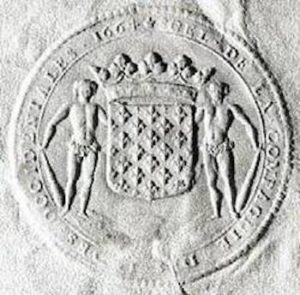
French West India Company Seal
*The French West India Company was founded on this date in 1664. It was a French trading company that participated in the Middle Passage.
It was created some three months before Jean-Baptiste Colbert's foundation of its eastern company. The company received the French possessions of the Atlantic coasts of Africa and America and was granted a monopoly on trade with America, which was to last for forty years. It was supposed to populate Canada, using the profits of the sugar economy that began in Guadeloupe. Its capital was six million pounds, and its headquarters was in Le Havre.
The company's stock was so considerable that 45 vessels took possession of all the places in their grant in less than six months and settled commerce; the license was revoked. In 1666, they organized the first census, counting 3215 inhabitants. The population of the colony grew to 6700 inhabitants in 1672. In 1667, several Canadian tribes of Iroquois, the Mohawks, and Oneidas agreed to make peace. The company got a monopoly on the slave trade from Senegal. In 1666, the company created two counters in Dahomey (Benin), Savi and Ouidah, which bought other tropical products. The company's French settlers in the Caribbean were smuggling with the Dutch. Its commercial monopoly led to the resale price of sugar becoming prohibitive compared to that of its English competitors, Barbados and Jamaica.
In 1665, the company acquired Saint Croix from the Knights of Malta. The colony was evacuated to San Domingo in 1695 when France battled the English and Dutch in the War of the Grand Alliance. French sugar planters complained and accused the company of not delivering enough slaves. At the same time, neighboring islands controlled by other European powers had imported slaves on a large scale from the early 1670s.
The island then lay uninhabited and abandoned for another 38 years when sold to the Danish West India Company. The Compagnie de Indes was suspected of counter-revolutionary activities, and on July 26, 1793, the Convention decreed the putting under the seal of the company's buildings. The second November 11, 1793 decree abolished the company and confiscated its ships and merchandise.